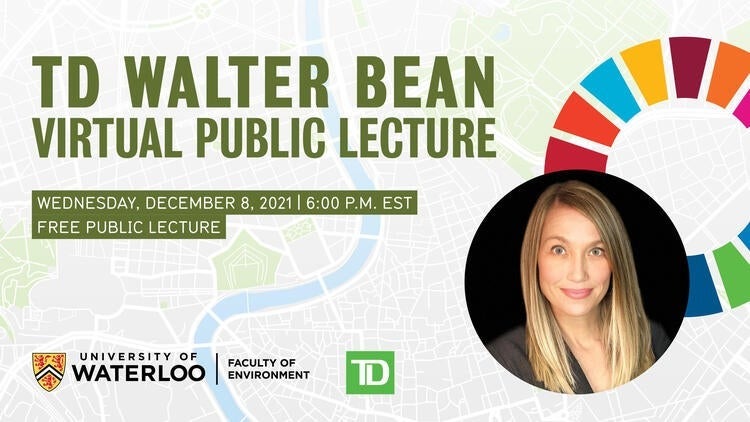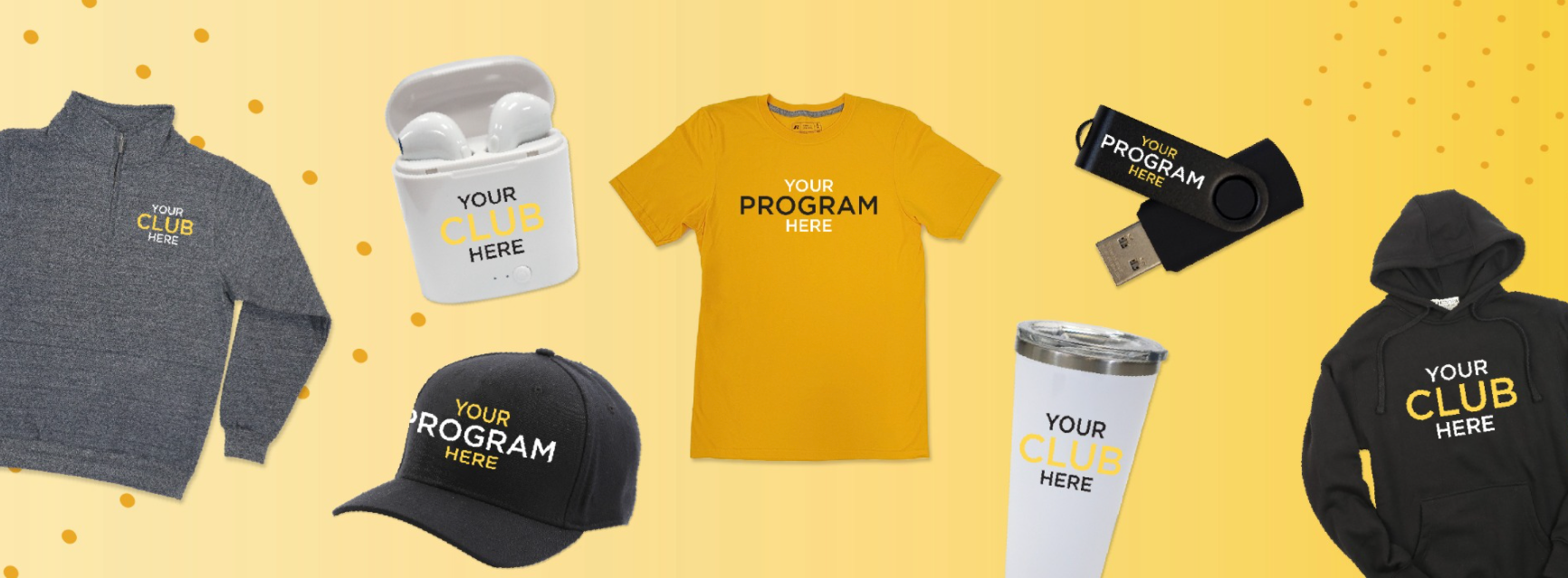- TD Walter Bean Lecture in Environment takes place tonight
- WatITis conference kicks off today
- Faculty of Arts celebrates 2021 Alumni Achievement Award winner
- Custom merchandise order program continues with increased lead times
- AI could help doctors make the best use of ICU beds during the pandemic
- We can't stop here, this is bat country: understanding white-nose syndrome
Editor:
Brandon Sweet
University Communications
bulletin@uwaterloo.ca
TD Walter Bean Lecture in Environment takes place tonight

The TD Walter Bean Public Lecture in Environment takes place tonight from 6:00 p.m. to 7:30 p.m. Register now.
In her talk, "MAD Water: Mobile, Adaptive & Decentralized Infrastructure for the Climate Change Era", Professor Amber Wutich will explore one of the greatest threats facing humans in the coming century - water insecurity.
While climate change is projected to destroy water systems, displace populations, and intensify water inequalities around the world, for many communities, the imagined dystopian future of severe water shortages has already arrived—shaped not so much by lack of water, but by aging infrastructure, underfunded utilities, social exclusion, politicized commodification, and environmental racism.
Dr. Wutich will illustrate how the missing key to solving water insecurity is hidden in the social infrastructure all around us and how social infrastructure—informal economies, social networks, and cultural norms—can be leveraged to distribute water in fair and just ways.

Dr. Amber Wutich is a President’s Professor of Anthropology and Director of the Center for Global Health at Arizona State University. Her two decades of community-based fieldwork are concerned with how inequitable and unjust resource institutions impact people’s well-being, especially under conditions of poverty—and how we can fix it. An expert on water insecurity and mental health, she directs the Global Ethnohydrology Study, a cross-cultural study of water knowledge and management in 22 countries. Wutich maintains longstanding ties in her field sites in Paraguay and Bolivia, and manages a global set of strategic Global Health alliances for ASU.
An ethnographer and methodologist, Dr. Wutich has published four books and over 100 articles, and edits the journal Field Methods. Her teaching has been recognized with awards such as Carnegie CASE Arizona Professor of the Year. Wutich has raised over $38 million in research funds, as part of collaborative research teams, from the U.S. National Science Foundation and other funders.
The virtual event takes place tonight a 6:00 p.m. Register now.
WatITis conference kicks off today

A message from Nathan Lee and Shah Chandon, conference co-chairs.
The 19th annual WatITis conference is being held virtually via Microsoft Teams today, December 8, 2021.
To view the sessions visit https://uwaterloo.ca/watitis/sessions-2021
Network with other IT professionals and learn more about information technology initiatives at the University of Waterloo. Hear from a variety of presenters including two keynote speakers:
- Cat Coode - founder of Binary Tattoo, one of Canada’s Top 20 Women in Cybersecurity 2021
- Professor Mark Giesbrecht - Waterloo’s Dean of Mathematics, founding member of the Ontario Research Centre for Computer Algebra
For more information about WatITis, visit https://uwaterloo.ca/watitis/.
Faculty of Arts celebrates 2021 Alumni Achievement Award winner

This article was originally published on the Faculty of Arts news site.
Kathy Hay earned her BA with a major in Psychology in 1998 — but it wasn’t a straight line from start to finish. Beginning her undergrad studies in 1979, she paused university to pursue a career in banking. Nearly 20 years later she completed her degree through Waterloo’s distance learning option. Now as a former banker, Kathy has brought a strategic and business lens to her roles in the not-for-profit charitable sector.
She is currently President and CEO of Kids Help Phone, leading the strategic direction and culture of Canada’s only national 24/7 bilingual e-mental health service for young people. Previously, she was President and CEO of Women’s College Hospital Foundation for which she was named one of Canada’s Top 25 Women of Influence in 2017. She has also held senior roles at the University of Toronto, the University of Guelph, and the Art Gallery of Ontario. Under Kathy’s leadership, Kids Help Phone counsellors and crisis responders had over 9 million interactions with youth across Canada since 2019.
Q and A with Kathy Hay, BA '98
What do you want people to understand about the needs of children and youth who call Kids Help Phone?
As pioneers in virtual care and the country’s expert in e-mental health solutions, a typical day at Kids Help Phone is supporting kids as young as 5 all the way through to young adults, 24/7 and nationwide. We always say that no problem is too small, and no problem is too big. Our goal is to be there for youth when, where and how they need us to be.
During COVID-19, youth have had a particularly tough time across the country, with many equity-seeking populations being disproportionately impacted as well. Kids Help Phone has been there for any and all issues — from anxiety and depression, loneliness, fear, abuse and suicide ideation. Because we are not only a youth charity, but also an innovation/technology not-for-profit, we knew we had work to do and I am proud to say that we did not go dark for one minute.
What I want people to know, young and not so young, is that Kids Help Phone will be there for you no matter what.
During the last 20+ months of unprecedented events, what was the most critical decision you made for Kids Help Phone response?
Kids Help Phone was facing challenges that every other company was facing: how to keep things going with so much uncertainty. And what was at stake for Kids Help Phone if we did not succeed was not our share price, but the wellbeing of the youth across Canada.
The ability of Kids Help Phone to respond to this crisis was actually based on a decision made three years before, long before a global pandemic. It stemmed from the recognition that steady state for the only e-mental health solution provider in Canada, was not an option because youth were changing faster than ever and technology even faster. Everything we do is based on technology and innovation.
We recognized that we were in fact a technology/innovation charity that has a razor-sharp focus on youth and mental health. That monumental mindset shift in October of 2018 set the stage for March 2020, ensuring we were built for scale to meet the enormous demands. Since March of 2020, Kids Help Phone has provided service to youth across Canada more than 9M times.
How can people support for Kids Help Phone as volunteers?
Kid Help Phone is shored up by staff, clinicians, volunteers and donors that span the country. Along with the 400 staff and clinicians it is humbling to have more than 4,000 volunteers stand up in supporting the youth of Canada, either as frontline volunteer crisis responders, or as community fundraising champions or on strategic committees and the Board of Directors. Volunteers go through our robust training program to be crisis responders through to community volunteers. For anyone wanting to volunteer to help have a true impact in the well-being of youth across Canada, thank you.
That cliché — it takes a village — stands true, and yet from my vantage point, what I see is an entire country doing what it takes to raise the youth of Canada, our future.
Custom merchandise order program continues with increased lead times

A message from Print + Retail Solutions.
Planning to give away some branded swag at an upcoming event? W Store has you covered – but the pandemic has introduced some challenges that we want you to be aware of.
W Store has continued to offer our Custom Merchandise Program throughout the pandemic to our campus community. We always aim to add value to this process through our vast vendor list, as we are often able to procure items at competitive prices and eliminate the work other departments would need to do when sourcing these items independently. Historically, we have provided this service with exceptional lead time and choice and within a wide range of budgets to meet expectations across campus. A key differentiator in our service is our ability to accommodate rush requests from departments, to accept departmental account numbers and save the tax, as well as our capacity to ship orders for free anywhere on campus.
The last twenty months have added an extra layer of complexity to this service due to the pandemic. The global supply chain has been significantly impacted, which has caused delays in shipping times, and increases in prices. We are hearing from our vendors that these issues will continue for at least another year before global challenges are resolved.
As we continue to support the campus with this service, please contact us as early as possible, to ensure on-time delivery. For more information about our Custom Merchandise Program, please email wstore@uwaterloo.ca.
AI could help doctors make the best use of ICU beds during the pandemic

This article was originally published on Waterloo News.
New technology could help doctors make the most of limited resources during the COVID-19 pandemic by identifying patients who require intensive care unit (ICU) treatment.
The system, developed by researchers at the University of Waterloo and DarwinAI, an alumni-founded startup company, uses artificial intelligence (AI) to predict the necessity of ICU admission based on more than 200 clinical data points, including vital signs, blood test results and medical history.
“That is a very important step in the clinical decision support process for triaging patients and developing treatment plans,” said Alexander Wong, a professor of systems design engineering and Canada Research Chair in AI and Medical Imaging at Waterloo.
The new AI software was trained using data from almost 400 cases at Hospital Sirio-Libanes in Sao Paulo, Brazil, in which doctors had decided if COVID patients should be admitted for intensive care.
Based on lessons learned from that known data, the neural network developed by researchers can predict the need for ICU admission in new COVID cases with greater than 95-per-cent accuracy. It also identifies the key factors that drive its predictions to help give clinicians confidence in them.
Rather than replacing doctors, the technology is meant to arm them with a new tool to make faster, more informed decisions and ensure the patients most in need of intensive care receive it.
“The goal is to help clinicians make faster, more consistent decisions based on past patient cases and outcomes,” said Wong, a director of the Vision and Image Processing (VIP) Lab at Waterloo. “It’s all about augmenting their expertise to optimize the use of medical resources and individualize patient care.”
Researchers have made the technology freely available so engineers and scientists around the world can work to help improve it.
They are now incorporating it into a larger clinical decision support system, developed in their ongoing COVID-Net open-source initiative, that also helps doctors detect COVID and determine its severity using AI analysis of medical images.
Wong collaborated on the ICU admission work with DarwinAI researchers Audrey Chung and Mahmoud Famouri and Andrew Hryniowski, an engineering PhD student in the VIP Lab.
A paper on the research, COVID-Net Clinical ICU: Enhanced Prediction of ICU Admission for COVID-19 Patients via Explainability and Trust Quantification, is scheduled for presentation on December 10 during a workshop at the 2021 Conference on Neural Information Processing Systems, the largest AI conference in the world.
We can't stop here, this is bat country: understanding white-nose syndrome

Photo credit: Townsend's big-eared bat courtesy of professor McGuire.
This article was originally published on Waterloo News.
When it comes to hibernation, conserving resources is key for an animal’s survival. For bats of Western North America, water may be the key to assessing a bat species’ ability to thrive during hibernation.
New research that comes as part of a larger project to understand the potential impact of white-nose syndrome in the West found that bats are adept at finding similar hibernation conditions across their large geographic ranges, despite a variety of climates in these areas.
“Understanding the differences, hibernation patterns and physiology of bats in the West is key to predicting the impact that climate change and diseases such as white-nose syndrome will have on these bats,” said Liam McGuire, a biology professor at the University of Waterloo who led the bat hibernation patterns and physiology portion of this project.
“White-nose syndrome has devastated bat populations in Eastern North America in recent years but many regions of the West remain unaffected. Understanding bat hibernation patterns can inform prevention and conservation efforts as this disease spreads west.”
Some bat species have very large ranges and may be found across much of the continent, so the team first collected measurements on two different species of bats throughout their ranges—Northwest Territories to Montana and British Columbia to Colorado. Despite vastly different climates found throughout these ranges, within the same species, hibernation physiology did not differ among populations, likely because bats are able to find similar roosting conditions throughout the range.
The researchers then expanded their research to compare the hibernation patterns of 13 different species of bats. Among the diverse list of species included in the study, there was variation in the temperatures preferred by hibernating bats, but at their preferred temperature all were able to reduce their rate of energy expenditure similarly in hibernation. However, differences appeared when comparing the amount of water that different species lost as they hibernated.
“Water is a crucial resource for survival. Bats that lose high amounts of water through their skin or in their breath may need to arouse more frequently to drink water, impacting their hibernation cycles and requiring more energy overall.”
This water loss may be the key to understanding the impact of white-nose syndrome in bats. Although the disease had not reached the western bats at the time of the study, McGuire’s team observed that, among bats that live across the entire continent, the bat species with high water loss are the ones most heavily impacted by white-nose syndrome along the East Coast.
The papers, “Interspecific variation in evaporative water loss and temperature response, but not metabolic rate, among hibernating bats” and “Similar hibernation physiology in bats across broad geographic ranges” were recently published in Nature’s Scientific Reports and the Journal of Comparative Physiology B, respectively. This project is a collaboration between the University of Waterloo, the Wildlife Conservation Society, the Wildlife Conservation Society Canada, Texas Tech University, University of Winnipeg, and Montana State University.
Upcoming office closures
The Arts Undergraduate Office will close today at 2:00 p.m. for a teambuilding holiday event.
Link of the day
80 years ago: the Battle of Hong Kong
When and Where to get support
Students can visit the Student Success Office online for supports including academic development, international student resources, immigration consulting, leadership development, exchange and study abroad, and opportunities to get involved.
Instructors looking for targeted support for developing online components for blended learning courses, transitioning remote to fully online courses, revising current online courses, and more please visit Agile Development | Centre for Extended Learning | University of Waterloo (uwaterloo.ca).
Instructors can visit the Keep Learning website to get support on adapting their teaching and learning plans for an online environment.
Course templates are available within your course in LEARN to help you build and edit your content and assignment pages quickly.
The following workshops, webinars, and events are offered by the KL team (CTE, CEL, ITMS, LIB):
- Independent Remote Course Design Essentials, self-directed, continuous self-enrollment course in LEARN.
- Independent Blended Course Design (iBlend), self-directed, ongoing
- Copyright Overview for Waterloo Instructors and Staff - self-directed, continuous self-enrollment course in LEARN.
-
NEW - Getting Started in LEARN (CTE6656), Friday, December 10, 10:00 a.m. to 12:00 p.m.
-
NEW - Getting Started in LEARN (CTE6656), Wednesday, December 15, 1:00 p.m. to 3:00 p.m.
Employees can access resources to help them work remotely, including managing University records and privacy of personal information. Here are some tips for staying healthy while working from home.
Stay informed about COVID cases on campus by consulting the COVID case tracker.
The Writing and Communication Centre has virtual services and programs to help undergrads, grad students, postdocs and faculty members with academic writing.
- Meet with writing advisors in one-to-one appointments to brainstorm, draft, revise, and polish. No time for an appointment? Try email tutoring for undergrads.
- Beat isolation and make writing progress at weekly Virtual Writing Cafés for grad students and faculty or PJ-Friendly Writing Groups for Undergrads.
- Take an online workshop or apply to our popular Dissertation Boot Camp program.
- Faculty can request custom in-class workshops for their courses, or the WCC can facilitate any existing workshops for student groups.
Co-op students can get help finding a job and find supports to successfully work remotely, develop new skills, access wellness and career information, and contact a co-op or career advisor.
The Centre for Career Action (CCA) is offering some in-person services for fall 2021. The Tatham Centre is open with front-desk support, limited in-person appointments and co-op consults. Services are also available virtually. Book an appointment online or Live Chat with our Client Support Team. The CCA is here to help.
If you feel overwhelmed or anxious and need to talk to somebody, please contact the University’s Campus Wellness services, either Health Services or Counselling Services. You can also contact the University's Centre for Mental Health Research and Treatment. Good2Talk is a post-secondary student helpline available to all students.
While the Library continues to focus on digital resources and consultations, our spaces are open for the fall term. Dana Porter Library is open Monday to Friday, 9 a.m. to 5 p.m., and Davis Centre Library is open Monday to Friday, 9 a.m. to 11 p.m., and Saturday and Sunday, 11 a.m. to 5 p.m. for drop-in individual study space, bookable individual study rooms, drop-in access to computers and printers, book pick-up services and IST Help Desk support. Special Collections & Archives and the Geospatial Centre will be accessible by appointment. Library staff are available for questions via Ask us. Full details on current services and hours are available on the Library’s COVID-19 Update webpage.
The Faculty Association of the University of Waterloo (FAUW) continues to advocate for its members. Check out the FAUW blog for more information.
The University of Waterloo Staff Association (UWSA) continues to advocate for its members. Check out the UWSA blog for more information.
The Sexual Violence Prevention and Response Office (SVPRO) supports all members of the University of Waterloo campus community who have experienced, or been impacted, by sexual violence. This includes all students, staff, faculty and visitors on the main campus, the satellite campuses, and at the affiliated and federated Waterloo Institutes and Colleges. For support, email: svpro@uwaterloo.ca or visit the SVPRO website.
The Office of Indigenous Relations is a central hub that provides guidance, support, and resources to all Indigenous and non-Indigenous campus community members and oversees the University's Indigenization strategy.
The Waterloo Indigenous Student Centre, based at St. Paul’s University College, provides support and resources for Indigenous students, and educational outreach programs for the broader community, including lectures, and events.
WUSA supports for students:
Peer support - MATES, Glow Centre, RAISE, Women’s Centre - Visit https://wusa.ca/peersupport to book an appointment either in person or online for the Fall term.
Food Support Service food hampers are currently available from the Turnkey Desk 24/7 in the Student Life Centre. Drop off locations are also open again in SLC, DC, DP, SCH and all residences.
Co-op Connection all available online. Check https://wusa.ca for more details.
Centre for Academic Policy Support - CAPS is here to assist Waterloo undergraduates throughout their experience in navigating academic policy in the instances of filing petitions, grievances and appeals. Please contact them at caps@wusa.ca. More information is available.
WUSA Student Legal Protection Program- Seeking legal counsel can be intimidating, especially if it’s your first time facing a legal issue. The legal assistance helpline provides quick access to legal advice in any area of law, including criminal. Just call 1-833-202-4571.
Empower Me is a confidential mental health and wellness service that connects students with qualified counsellors 24/7. They can be reached at 1-833-628-5589.
GSA-UW supports for graduate students: the Graduate Student Association (GSA-UW) supports students’ academic and social experience and promotes their well-being.
Advising and Support - The GSA advises graduate students experiencing challenges and can help with navigating university policies & filing a grievance, appeal, or petition.
Mental Health covered by the Health Plan - The GSA Health Plan now has an 80 per cent coverage rate (up to $800/year) for Mental Health Practitioners. Your plan includes coverage for psychologists, registered social workers, psychotherapists, and clinical counsellors.
Dental Care - The GSA Dental Plan covers 60 per cent to 70 per cent of your dental costs and by visiting dental professionals who are members of the Studentcare Networks, you can receive an additional 20 per cent to 30 per cent coverage.
Student Legal Protection Program - Your GSA fees give you access to unlimited legal advice, accessible via a toll-free helpline: +1-833-202-4571. This advice covers topics including housing disputes, employment disputes, and disputes with an academic institution.
The Graduate House: Community Space Open M - F @ 11:30 a.m. to 6:00 p.m. - We’re open to all students, faculty, staff, and community members. The Graduate House is run by the GSA-UW. Graduate students get special discounts. We are hiring all positions. Bring your resume to the bar.
BIPOC Student Collective - The Collective is a safe space for BIPOC LGBTQ2+ students and aims to foster intergenerational and peer-to-peer support and mentorship. Join the online Discord channel for solidary chats and drop-in sessions.
When and Where (but mostly when)
Healthy Warriors at Home (Online Fitness).
Warriors vs. Laurier Blood Donation Battle. Join your fellow Warriors, donate blood and help us win the Blood Battle against Laurier for a second year in a row. Set up a profile or add the PFL code: UNIV960995 to your account if you have a blood.ca account already. Questions? Contact WarriorsInfo@uwaterloo.ca.
Drop-in to Warrior Virtual Study Halls on Wednesdays from 5:30 p.m. to 7:00 p.m. Come together in this virtual space to set goals and work independently or in groups each week.
Renison English Language Institute continues to offer virtual events and workshops to help students practice their English language skills.
Friesen Lecture with Sir Mark Walport, “When Science meets Society: the competition between knowledge and values,” Wednesday, December 8, 10:30 to 11:30 a.m., virtual event via MS Teams Live Events, register to receive the event link.
TD Walter Bean Lecture in Environment, “MAD Water: mobile, adaptive and decentralized infrastructure for the climate change era,” Wednesday, December 8, 6:00 p.m.
WaterTalk: Global water security under changing socio-economic and climate conditions, presented by Taher Kahil, Thursday, December 9, 10:00 a.m.
UWSA presents Steady State Q&A, Thursday, December 9, 12 noon until 1:00 p.m., via Teams.
Spiritus Ensemble, conducted by Kenneth Hull, Professor Emeritus at Conrad Grebel University College, presents Handel's Christmas Messiah, Sunday, December 12, 3:00 p.m. and 5:00 p.m. Seating is limited - tickets available online at Eventbrite.com or through spiritusensemble.com.
NEW - Portfolio & Project Management Community of Practice (PPM CoP) session, "Project and portfolio management tool demo" Wednesday, December 15, 9:00 a.m. to 10:00 a.m. Register for this event.
Positions available
On this week's list from the human resources department, viewable on the UWaterloo Talent Acquisition System (iCIMS):
- Job ID# 2021-7708 - Research Financial Analyst - Office of Research, USG 7 - 10
- Job ID# 2021-7711 - Research Financial Analyst - Office of Research, USG 7 - 10
- Job ID# 2021-7705 - Assistant University Secretary and Administrative Officer - Secretariat, USG 10
- Job ID# 2021-7666 - Social Media & Digital Communications Officer - Dean of Mathematics, USG 8
- Job ID# 2021-7283 - Undergraduate Program Manager - Statistics and Actuarial Science, USG 9
- Job ID# 2021-7424 - Optical Services Administrative Assistant - Optical Services - School of Optometry and Vision Science, USG 4
- Job ID# 2021-7499 - Administrative Coordinator - Arts Computing Office, USG 7
- Job ID# 2021-7658 - Alumni Development Officer - School of Accounting and Finance, USG 9 - 10
- Job ID# 2021-7644 - Graduate Financial Aid Records Specialist - Graduate Studies and Postdoctoral Affairs, USG 7
- Job ID# 2021-7700 - Research Coordinator, Natural Sciences, Engineering and Math - Office of Research, USG 8
- Job ID# 2021-7695 - Senior Construction Coordinator - Plant Operations, USG 8 - 9
- Job ID# 2021-7040 - CRM Graduate Marketing Specialist - Graduate Studies and Postdoctoral Affairs, USG 9
Secondments/Internal temporary opportunities
- Job ID# 2021-7710 - Grants and Contracts Manager - Institutional Research - Office of Research, USG 9 - 11
- Job ID# 2021-7654 - Immigration Consultant - Student Success Office, USG 9
- Job ID# 2021-7645 - Program Development Specialist - CEE - Work Integrated Learning Programs, USG 10
- Job ID# 2021-7649 - Business Systems Analyst - Office of the Registrar, USG 9 - 10
- Job ID# 2021-7631 - Lab Instructor/Media Technician - Stratford School, USG 9
- Job ID# 2021-7640 - Student Services Assistant - Arts Undergraduate Office, USG 5
- Job ID# 2021-7656 - Communications and Outreach Officer - Chemical Engineering, USG 8
- Job ID# 2021-7721 - Senior Manager, Liaison and Integrated Communications - University Research (IQC), USG 11
- Job ID# 2021-7694 - Building Attendant - Plant Operations, CUPE
Affiliated and Federated Institutions of Waterloo opportunities